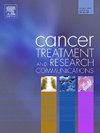Comprehensive pan-cancer analysis identified NSD2 as a potential prognostic and diagnostic biomarker
IF 2.4
Q3 Medicine
引用次数: 0
Abstract
NSD2 is a histone lysine N-methyltransferase that plays a crucial role in complex cancer biology. Despite mounting evidence highlighting the critical role of NSD2 in tumor progression and immunity, a comprehensive pan-cancer analysis of NSD2 has yet to be performed to determine whether NSD2 can be used as a viable biomarker, for cancer screening, prognostic prediction, and for the accurate design of therapeutic regimens for a variety of human malignancies. malignancies. This study was based on TCGA, TIMER2.0, cBioPortal, TCGA plot R software package and comprehensively investigated the expression of NSD2 in 33 different tumors, clinical phenotype, survival analysis, immune infiltration, genetic alterations, correlation with TMB and MSI, enrichment analysis and prognostic significance. The results showed that NSD2 was significantly overexpressed in most tumors and significantly correlated with low OS in different tumor types. Our findings suggest its potential oncogenic and epigenetic role. Amplification was the most common type of NSD2 variant. Immune infiltration analysis revealed a strong correlation between NSD2 and different immune cells. NSD2 was significantly associated with TMB and MSI in several cancers. Furthermore, enrichment analysis revealed associations between NSD2 and cell cycle and DNA repair pathways as well as various cellular functions. These findings suggest that NSD2 may serve as a potential prognostic biomarker and target for immunotherapy of various cancers.

综合泛癌症分析发现NSD2是一种潜在的预后和诊断生物标志物
NSD2是一种组蛋白赖氨酸n甲基转移酶,在复杂的癌症生物学中起着至关重要的作用。尽管越来越多的证据强调了NSD2在肿瘤进展和免疫中的关键作用,但尚未对NSD2进行全面的泛癌症分析,以确定NSD2是否可以用作可行的生物标志物,用于癌症筛查、预后预测以及各种人类恶性肿瘤治疗方案的准确设计。恶性肿瘤。本研究基于TCGA、TIMER2.0、cbiopportal、TCGA plot R软件包,综合研究了NSD2在33种不同肿瘤中的表达、临床表型、生存分析、免疫浸润、基因改变、与TMB和MSI的相关性、富集分析及预后意义。结果显示,NSD2在大多数肿瘤中显著过表达,并与不同肿瘤类型的低OS显著相关。我们的研究结果表明其潜在的致癌和表观遗传作用。扩增是NSD2变异最常见的类型。免疫浸润分析显示NSD2与不同的免疫细胞有很强的相关性。在几种癌症中,NSD2与TMB和MSI显著相关。此外,富集分析显示NSD2与细胞周期和DNA修复途径以及各种细胞功能之间存在关联。这些发现表明NSD2可能作为一种潜在的预后生物标志物和多种癌症免疫治疗的靶点。
本文章由计算机程序翻译,如有差异,请以英文原文为准。
求助全文
约1分钟内获得全文
求助全文
来源期刊

Cancer treatment and research communications
Medicine-Oncology
CiteScore
4.30
自引率
0.00%
发文量
148
审稿时长
56 days
期刊介绍:
Cancer Treatment and Research Communications is an international peer-reviewed publication dedicated to providing comprehensive basic, translational, and clinical oncology research. The journal is devoted to articles on detection, diagnosis, prevention, policy, and treatment of cancer and provides a global forum for the nurturing and development of future generations of oncology scientists. Cancer Treatment and Research Communications publishes comprehensive reviews and original studies describing various aspects of basic through clinical research of all tumor types. The journal also accepts clinical studies in oncology, with an emphasis on prospective early phase clinical trials. Specific areas of interest include basic, translational, and clinical research and mechanistic approaches; cancer biology; molecular carcinogenesis; genetics and genomics; stem cell and developmental biology; immunology; molecular and cellular oncology; systems biology; drug sensitivity and resistance; gene and antisense therapy; pathology, markers, and prognostic indicators; chemoprevention strategies; multimodality therapy; cancer policy; and integration of various approaches. Our mission is to be the premier source of relevant information through promoting excellence in research and facilitating the timely translation of that science to health care and clinical practice.
 求助内容:
求助内容: 应助结果提醒方式:
应助结果提醒方式:


